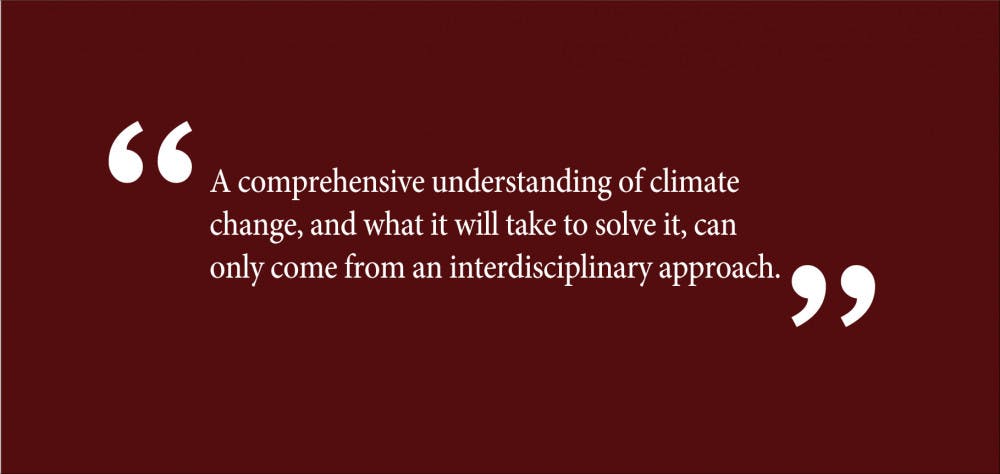I study the end of the world. My diploma will say environmental studies, but in practice my undergraduate education will have been on the apocalypse, or ideally, its aversion. The dangers of climate change are so immediate and severe that to not study them seems, in my own biased view, like burying one’s head in the sand. And yet, despite my overwhelmingly positive experience with the department, I don’t think everyone should be an environmental studies concentrator.
The best way for a university to cultivate a student body ready to take on climate change is not to direct everyone toward a sustainability major, but rather to make sure that issues of sustainability are ever-present — inescapable, even — no matter what you study. It is for this reason that I applaud the introduction of certificate programs into the University curriculum and make the case for students to use this new opportunity to bring sustainability to the forefront of their education.
It is misleading for numerous reasons to think of environmental studies as the sole discipline assigned to confront climate change. For one, “environmental studies” is not one set field. My own concentration is made up of classes in five different departments, and the classes I’ve taken with an ENVS designation have been informed by biology, chemistry, urban studies, political science, economics, finance and engineering, to name a few. Environmental studies is fundamentally the interaction of the human environment with everything we do in the world, and it cannot be studied in a vacuum.
Another reason why the study of sustainability cannot be restricted to one concentration is that climate change is a “super wicked problem” (yes, that is a technical term) — a difficult-to-define problem that resists all conventional and straightforward solutions and must be approached from multiple angles and paradigms. Like a game of whack-a-mole, any attempt to counter climate change through one discipline (politics, capital markets, technology) will reveal another problem popping up out of another. A comprehensive understanding of climate change, and what it will take to solve it, can only come from an interdisciplinary approach.
If it were up to me, every concentration at Brown would require some coursework on the intersection between itself and sustainability. But seeing as that could brush up against the open curriculum, earning a sustainability certificate is a good start. No matter their study, students can consider how to view their concentration through a sustainable lens, often in unexpected ways. Given an introduction into the challenges of climate change and human impacts on the environment, I expect that every student at Brown would be able to identify how their work can relate.
Whether a pure math concentrator looking at forecasting models, a computer science concentrator learning about the energy consumption of data servers or a psychology concentrator contributing to the growing understanding of climate grief, a link to sustainability can be found in each concentration. These examples are not cherry-picked; I truly believe that everyone can benefit from the study of sustainability in the context of their chosen field.
It is becoming clear that our response to climate change, whether or not we manage to limit warming to so-called “safe” levels, will consist of a broad-based societal transformation. The world that all of us will graduate into will be shaped by the impacts of climate change and the transition to a sustainable future. Regardless of your concentration, you will have to face the effects of climate change in your life.
So to preempt that undesirable future, students should officially integrate sustainability offerings into their curriculum through the certificate program. A sustainability certificate could bring together minds from across Brown, trained to think in diverse and creative mindsets, to solve pressing issues. Rather than getting caught up in the bubble of one discipline, certificate courses that cater to a mix of concentrators can spark discussions that a group of environmental studies concentrators alone could never have. It would be my hope that the certificate program would not just require introductory courses, but also higher-level seminars that specifically apply sustainability questions to STEM fields, social sciences or the humanities individually.
But no matter what form the certificate program eventually takes, furthering an interdisciplinary approach to solve environmental problems can only be a good thing for Brown, its students and for the planet.
Clare Steinman ’19 can be reached at clare_steinman@brown.edu. Please send responses to this opinion to letters@browndailyherald.com and op-eds to opinions@browndailyherald.com.



